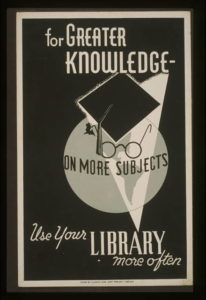calsfoundation@cals.org
The Winter of Our Content
Content.
Those seven letters essentially make up one word with two somewhat different but related meanings (and different pronunciations). The first sense is the one evoked by a “table of contents,” for example, meaning something that is contained. In the second sense, the word can be used as either a verb or adjective, as with the sentences “Content yourself with what you have” or “I am content,” denoting a state of satisfaction.

Both senses of the word stem from the Latin continere, meaning “to hold together or enclose.” Contents constitute something held together, while to be content is to be enclosed in satisfaction. From this point on, I will distinguish the latter meaning by italicizing the word: content.
I’ve been thinking about these seven letters, this one word, quite a lot lately. If you help to manage a website, as I do, one of the constant pressures you are under is the alleged need to be generating “content” rather constantly. The attention span of the web-browsing public is short, and thus you must always be producing a new article, a new YouTube video, a new podcast episode, a new tweet, a new Facebook post. What matters most is clicks, engagement, and the best way to generate clicks is through new content.
If you are a writer, you have to be on Twitter so that you can, every day, be generating new content, because the process of producing a book is invisible to everyone else, and you must keep your audience engaged, or else they will forget you during the years it takes to put your next tome before the public.

But what is all this content? What purpose does it serve? I created a Twitter account myself some years back, at the urging of my own publisher, and have occasionally dipped my toes into the world, thinking it might be neat to follow certain scholars, those with whom I share certain interests and those with whom I do not. Maybe I picked up a few nuggets of insight, but for the most part, everyone is going around striving to generate content to keep folks interested, content that has nothing to do with the reason I wanted to follow said person. For what possible reason do I need to know that a certain Harvard Extension School professor hates Indian food and has a fluffy black cat?
Everyone is convinced that the constant generation of content, regardless of its quality, is what it takes to keep one’s head above water in the digital world, and so everyone is constantly generating content, regardless of its quality, and so keeps raising the water level even higher.
Ironically, the perpetual increase in content only leaves people more and more discontented.

Now, the website I help to manage, the Encyclopedia of Arkansas, does generate content, and at a fairly good clip, too, usually more than one new entry a day, year after year, with twice as much media. But this isn’t just stuff to generate engagement. No one would strive to have the histories of most every Scott County town as a means of increasing clicks. (No offense to Scott County intended.) We have those entries, and thousands of others like them, covering a range of obscure but fascinating topics (in addition to the ones on more well-known subjects), not because we think a lot of people might happen to engage with them, but because it’s likely that they present the information that someone out there needs right now, be that someone a student, teacher, legislator, government worker, historian, biologist, or journalist.
And likewise, we do not generate entries with little thought to quality. Instead, we might take months to get something online. We have a whole editorial process that starts with recruiting an author and goes through editing, outside review, revision, fact checking, copyediting, and constant updating once online. The entries we upload now often necessitate additions to or revisions of entries we uploaded years and years ago. The EOA is not merely an ever-growing resource—it is an ever-evolving one, with changes to one area sometimes impacting whole other regions of the website. We are never content with the mere addition of more content.
But mimesis is a powerful social force, and with others out there constantly generating content, dare we be content with our standards?
Yes.
We can scorn to change our state with the kings of content precisely because our focus lends us something much more precious—authority. While many of our entries are diverting and entertaining (terrorist group hacking the Arkansas Library Association, anyone?), they, more importantly, are reliable, precisely because we work hard to make them that way, to make this whole website a rock upon which countless others can build.
And with that goal, we can always be content.
By Guy Lancaster, editor of the CALS Encyclopedia of Arkansas




